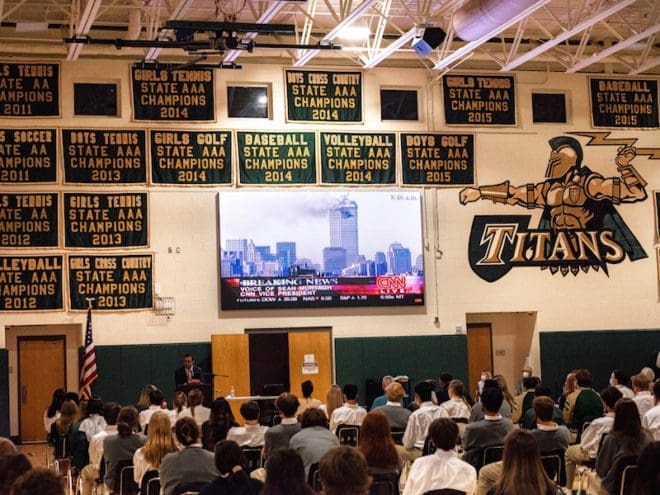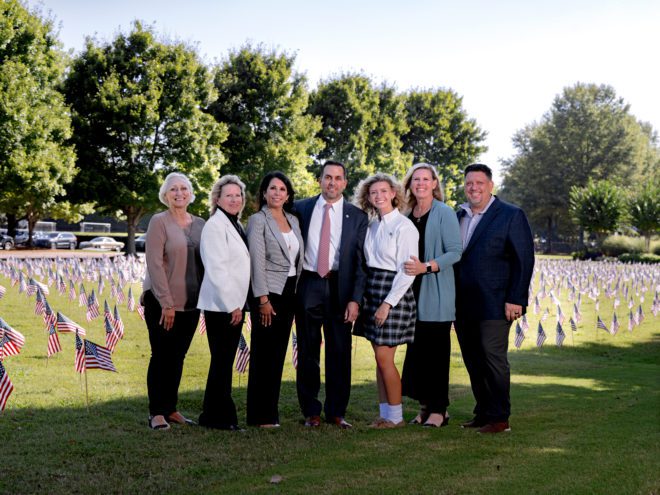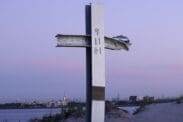 Photo by Johnathon Kelso
Photo by Johnathon KelsoRoswell
9/11 remembrance challenges Blessed Trinity students to lives of service
By ANDREW NELSON, Staff Writer | Published September 16, 2021
ROSWELL—The students filling the bleachers and the plastic chairs of the Blessed Trinity High School gym never saw the Twin Towers looming over the New York skyline or witnessed the skyscrapers crumble. Their education regarding 9/11 has been formal with book learning in the classroom and informal with prayers at remembrance services.
But Moira Clark remembers the day. She is an original member of the high school faculty, teaching history and government in Room 410, the same classroom where a TV was tuned to watch tragedy unfold 20 years ago. “We were all watching the TV. I looked up and saw the towers come down,” she said.
On that day, school came to a stop. Faculty, administrators and students filed into the school gym for an impromptu Mass.
“We prayed immediately,” Clark said. Students were released at noon.
The Sept. 11 attacks on New York, the Pentagon and the downing of United Airlines Flight 93 in rural Pennsylvania launched what became the war on terror, leading to sprawling wars. Several thousands of U.S. military women and men were killed across combat zones in Afghanistan and Iraq, along with hundreds of thousands of Iraqi and Afghan civilians dead, according to a 2018 report by Brown University.
Student leaders continue to plant flags for each 9/11 victim on the grassy lawn outside the school. This year, the American flags will stay up for 20 days to mark the anniversary.
Commemorating the 20 years since the four planes were hijacked, a retired Air Force serviceman spoke Sept. 8 to the school community about that tragic day, starting in the morning when a shorter-than-usual commute put him in the Pentagon parking lot.
Kevin Carpenter began the cloudless Tuesday with a prayer in his car before heading to his office where he worked on classified communications systems. His office was in the outermost ring of the Department of Defense headquarters. He was a 30-year-old enlisted man, proud to work in the fast-paced environment.
At 9:37 a.m., he heard the roar of jet engines. American Airlines Flight 77 hit the building, a little more than the length of a football field away from his office. The explosion shook the building. Paint fell from the ceiling. The smell of jet fuel filled his nose.
“It was just a final moment, like the solitude of that moment is indescribable,” he said. “I can’t tell you what that felt like, that moment of peace, where you’re just kind of accepting that this is it.”
There were 59 passengers and crew killed on the plane and 125 in the Pentagon. The attacks killed nearly 3,000 people.

Guest speaker Kevin Carpenter recounts his experience of being at the Pentagon the morning of the September 11 attacks. Carpenter works as a cybersecurity policy analyst in the Office of Management and Budget. Photo by Johnathon Kelso
During his 40-minute talk, Carpenter paused several times to control his emotions. He recalled his commanding officer, in the chaos of the evacuation, told him to flee the building while his gut told him to try to help the wounded. He left, but carried the guilt for nearly 20 years.
The day ended with him covered in soot. He made his way home, determined to walk the 20 miles. A passing bus picked him up. After hours of silence, he finally talked to his wife, Angela, who had picked up their two small children and spent much of the day not knowing whether he was alive.
Leaving the Pentagon haunted him for years. He felt he’d betrayed his higher calling to help people. That is until the end of the recent conflict in Afghanistan. In the rush to evacuate people, he leaned on his military contacts and communications know-how to help Afghan interpreters and others who helped the U.S. mission there to be whisked to safety.
“And I’m happy to say, I’m happy to say, folks, I’ve redeemed myself for what I didn’t do on 9/11,” he said.
Focusing on small gestures
Carpenter, who is now a cybersecurity policy analyst in the Office of Management and Budget, charged Blessed Trinity students to live a life of purpose and look for an opportunity to make a difference in the lives of others. He encouraged them to focus on small gestures, being kind and helping peers.
Later, a round table of students ages 16 and 17 talked about 9/11. Nearly all of them were first aware of the dark day starting in grade school.
Seniors Sarah Chernik, Ryan Scott and Jack Pirinelli plan to attend the U.S. Military Academy. All three are student athletes committed to Army sports teams. Scott and Pirinelli have visited the National 9/11 Memorial & Museum in New York.
As an athlete, Scott said he could have made the “easy choice” to play and attend top universities, but instead will be part of the military.
“There is a calling to serve. It’s a privilege to serve,” he said.

Guest speaker Kevin Carpenter, center left, and 9/11 Flag Memorial Scholarship recipient Lauren Leszynski, center right, gather together in front of the 9/11 memorial at Blessed Trinity with faculty and family. From left to right, business teacher Karen Hurley, Principal Cathy Lancaster, Angela Carpenter, Kevin Carpenter, Lauren Leszynski, Christina Leszynski and Matt Leszynski. Photo by Johnathon Kelso
Neva Miller, a 15-year-old sophomore, said Carpenter showed people far from the attacks could be injured, even though it was not physical. Carpenter’s wife went for hours without hearing from him, which must have deeply frightened her and shaped her life, said Miller, who is interested in attending the U.S. Naval Academy. And while Carpenter was uninjured, he carried guilt from the day through the years.
“It shaped who he was and it shaped his future,” she said.
Cara Bianco and Amelia Cooper, both 17 and seniors, are behind an effort to organize a tribute to military members affiliated with the school. They are also helping to raise money to support a patriotism scholarship and a veterans organization.
Carpenter left them inspired.
“It’s the smallest thing that can change people’s lives,” said Cooper.
In 2001, at the school, Clark recalled a teacher with a brother who worked as a New York City firefighter, so the school community cared for her. He was safe, but the fear was real, she said.
Since then, Clark has taught about the day “through the lens of Catholic values.” Students examine factors causing the event, what can be learned from history and finding solutions with tolerance and understanding. “We can all be part of solutions,” said the teacher.
